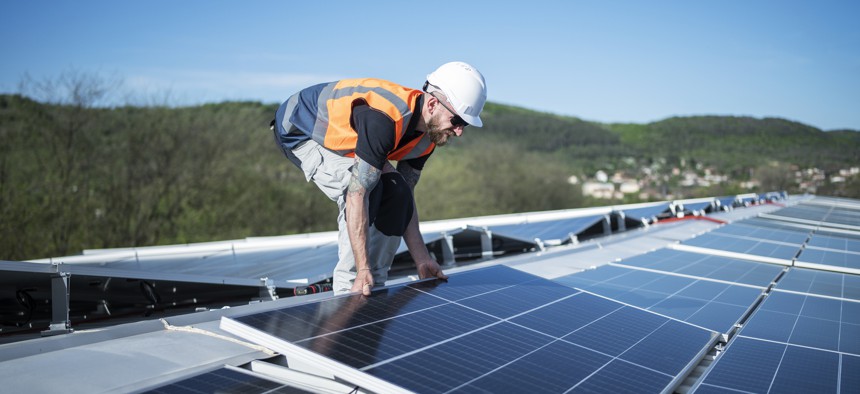Who should have land-use authority in green energy projects?

ArtistGNDphotography via Getty Images

Connecting state and local government leaders
Michigan lawmakers are considering legislation that would shift some land-use authorities to the state to streamline renewable energy developments. But local governments and residents fear their voices will get left behind in the race to build green infrastructure.
Michigan has spent decades cultivating its image as the heart of the country’s automotive industry, where iconic American cars roll off assembly lines and into garages nationwide. With a history and economy so entwined with automotive manufacturing, many Michiganders have been reluctant to lean into green energy and electric vehicles. State leaders, however, are pushing ahead with new urgency.
Under Gov. Gretchen Whitmer, Michigan is aiming to phase out the state’s remaining coal plants, source 60% of its energy from renewable sources and get 2 million more electric vehicles on the road by 2030. To meet those goals, the state needs to build out wind turbines, solar farms, energy storage plants and smart grids. But just how to get that green infrastructure built quickly is sparking contentious debate.
The state legislature is considering a package of bills that would shift siting and permitting for large renewable energy developments from local authorities to the state’s Public Service Commission. Smaller projects—facilities with capacity under 100 megawatts—would remain under local oversight. But jurisdictions across the state argue that decisions around projects large or small should be left to the communities they directly impact.
State lawmakers are pushing the legislation to get renewable energy online faster. Sponsors of the bills said the changes would give more control to property owners interested in working with developers.
Local regulations can delay renewable energy development, and Michigan is far from alone in experiencing these land-use tensions. The Sabin Center for Climate Change Law at Columbia Law School published a report in May that found at least 228 communities across 35 states have restrictions “that are so severe that they could have the effect of blocking a renewable energy project.” The report also noted a 57% increase in “the number of projects facing serious organized opposition” over last year’s analysis.
The proposals still require developers to work with locals to ensure the projects benefit the communities where they’re built and they mandate that developers host public meetings to share information about the facilities, The Michigan Advance reported. But the bills strip some authority away from local governments that have long enjoyed the final say in land-use decisions.
“The question is not about whether or not Michigan needs more renewables,” said Judy Allen, director of government relations for the Michigan Township Association. “The question is, who should have the authority to site and approve them? And we believe there should be balance, that the local units should have that option.”
Michigan’s Public Service Commission already has oversight of projects like oil and gas pipelines, but renewable energy is a different ballgame, Allen said. Pipelines run underground, while solar fields cover scores of acres, removing huge swaths of land from other potential uses. Many communities already have their own long-term economic master plans outlined and may have difficulty adapting those plans to new facilities the state approves.
“These facilities are going to be in communities for probably 35 to 50 years minimum,” Allen said. “It's going to have a lasting impact.”
Wind and solar energy installations require at least 10 times more land compared to fossil fuels, according to the Brookings Institution. Renewable energy projects are also much more visible—many wind turbines in the United States today are at least 300 feet tall, and a utility-scale solar plant can require up to 10 acres per megawatt.
The Michigan Township Association has several concerns about details missing from the legislation, including requirements for developers to have a fire plan and a cap on how much land in a town could be approved for energy projects, Allen said. The proposal also allows developers who, once they have been granted a permit, to make minor changes to their plans without needing to first seek approval from the state or locality, a provision that could lead to public safety issues, she added.
Residents’ and local officials’ concerns about the impact of renewable energy facilities in their communities shouldn’t be ignored, said Patrick Welch, a policy analyst on the climate strategies team at the Lincoln Institute of Land Policy.
The urgent need for this energy infrastructure “does require more streamlined processes, but not [ones] that prevent proper analysis and input,” he said. The environmental, economic and cultural objections residents have are valid, he said, but there needs to be a balance between those local concerns and what’s best in the long-term battle against climate change, he said.
Leaders across all levels of government agree on the urgent need to develop renewable energy sources, but “you can't keep having the very local vetoes stopping projects,” Welch said. Successful green energy development requires “a really careful balance,” he added.
To reduce carbon emissions without alienating residents, legislation must be transparent and require developers to engage with residents and local officials and educate the public about their renewable energy projects, Welch said.
“That is imperative and could go a long way in creating more of an atmosphere of trust.”

NEXT STORY: ‘Worse than people can imagine’: Medicaid ‘unwinding’ breeds chaos in states



